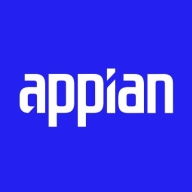

OpenText 360 for SharePoint and Appian compete in the enterprise content management and business process management sectors. Appian seems to have the upper hand due to its low-code rapid development environment, facilitating faster deployment of complex workflows.
Features: OpenText 360 for SharePoint offers superior document management, integration with Microsoft Teams, and sophisticated workflow construction. It enhances document security through document traceability and collaboration. Appian stands out with its rapid development enabled by low-code platforms, robust process modeling, and agile adaptability, suitable for deploying complex workflows swiftly.
Room for Improvement: OpenText 360 needs better integration capabilities, particularly with Office 365, a simpler licensing model, and enhancement in service outages and backup processes. Appian could enhance customization flexibility in its user interface, simplify its form creation language, and expand its mobile capabilities. Better error handling and documentation are also needed to support diverse business requirements.
Ease of Deployment and Customer Service: OpenText 360 supports varied deployment options, including on-premises and cloud models, with users valuing Microsoft's professional services for consistent problem resolution. Appian favors public cloud infrastructure, offering ease of maintenance. Its customer service is praised for responsiveness, though scalability and troubleshooting could improve.
Pricing and ROI: OpenText 360 is costlier, especially for on-premises installations, with complex licensing but provides strong ROI through effective document management in the Microsoft ecosystem. Appian, while considered expensive, offers a flexible licensing model and significant ROI through fast deployment. Its cost-effectiveness in large-scale BPM implementations makes it a financially attractive choice compared to competitors like Pega.
They see return on investment in terms of cost savings, time savings, more efficient processes, and more efficient employees.
Appian is very efficient, allowing us to build a lot of applications within a financial year, making it cost-effective.
The return on investment provided by OpenText 360 for SharePoint is excellent, and that is why we are continuing this team for the past 3 years.
It eliminates the challenges associated with handling files on local servers and allows efficient document management.
The technical support for Appian rates as 10 out of 10 because they have a great support team.
Their customer service is responsive, and the team is very prompt for support.
The technical support is generally good.
I have not directly contacted vendor support but use forums for any queries or issues while utilizing OpenText 360 for SharePoint.
On a scale of one to 10, Appian rates as a nine for scalability.
Initially, without much coding, I can easily handle five thousand records.
Appian is scalable, but it depends on how you build your applications.
It depends on how it has been designed and how it has been configured.
The stability of Appian would rate as nine, as it's a stable environment.
It has room to improve for use cases where the users are public facing, where anonymous users could come to a site and run a business workflow or interact with some data.
I would like to see more enhancement in the user interface to allow more freedom in designing the sites and pages.
If there is a very complex process that includes a lot of data transitioning and memory-centric processes, it consumes a lot of memory.
If it were possible to merge everything and bring all information from multiple teams (Cognos, ClickView, AWS) into SharePoint as a centralized place, it would be really helpful.
The GUI should be improved for better user experience.
Integration with a feature like Planner could assist in assigning tasks to specific individuals for follow-up.
On the pricier side, both Appian and Pega are enterprise-level solutions, placing them on the slightly higher side.
The price of Appian, on a competitive landscape, is a little bit on the higher side for companies, rating maybe a 6.5.
The pricing of Appian is based on the number of users and generally ranges from 70 to 100 USD per user per month.
Pricing is very affordable as it is part of the Office 365 suite, costing around five dollars per user.
As an enterprise organization, we have enterprise service level agreements with customers and Microsoft partners, where organizations receive yearly discounts.
In terms of pricing, OpenText 360 for SharePoint is more expensive than Microsoft.
Appian also utilizes AI for business users, providing a feature called process each view, enabling business users to create their own dashboards, reports, and gain insights from their data and processes using artificial intelligence.
The zero-code integration feature is remarkable, allowing for ease of data transfer and workflow enhancement.
It is easy for me to define the process and create configurable workflows.
OpenText 360 for SharePoint significantly saves time for users by streamlining the tasks of handling, searching, and maintaining documents compared to traditional file servers.
The metadata can be retrieved from the SharePoint list, and those libraries and metadata serve as a very effective way that I am utilizing SharePoint, apart from just storing documents.
OpenText 360 for SharePoint integrates seamlessly with Microsoft Teams, allowing me to monitor and manage projects and task issues using mobile devices.
| Product | Market Share (%) |
|---|---|
| Appian | 4.7% |
| OpenText 360 for SharePoint | 0.7% |
| Other | 94.6% |


| Company Size | Count |
|---|---|
| Small Business | 20 |
| Midsize Enterprise | 9 |
| Large Enterprise | 41 |
| Company Size | Count |
|---|---|
| Small Business | 6 |
| Midsize Enterprise | 2 |
| Large Enterprise | 9 |
Appian is a unified low-code platform and solution used by businesses to build enterprise applications and workflows. This product adapts to the needs of clients and the technologies they are already using to combine their data in a single workflow and maximize resources. The platform has four main components through which it transforms the work process for companies of various sizes. They are:
Appian is utilized across a diverse set of industries, including automotive and manufacturing, energy and utilities, education, financial services, telecom and media, transportation, retail, insurance, healthcare, and life sciences. The most frequent use cases of Appian are customer journey, governance, risk and compliance, operational efficiency, supply chain, distributed order management, and environmental, social, and governance (ESG) management.
Appian Features
Appian has various features that allow users to create solutions for their businesses. These features can be separated into a few groups according to function, including automation, low-code application development, and integrations and data. Some of the most frequently used features of Appian include:
Appian Benefits
The benefits of using Appian include:
Reviews from Real Users
A practice leader - digital process automation at a computer software company values Appian highly because the product is easy to develop, low-code, and has a good user interface.
Alan G., an advisory board member at Codecon VR, Appian offers a clear application life cycle, easy to learn documentation, and comes with a fundamentals course.
We monitor all Business Process Management (BPM) reviews to prevent fraudulent reviews and keep review quality high. We do not post reviews by company employees or direct competitors. We validate each review for authenticity via cross-reference with LinkedIn, and personal follow-up with the reviewer when necessary.